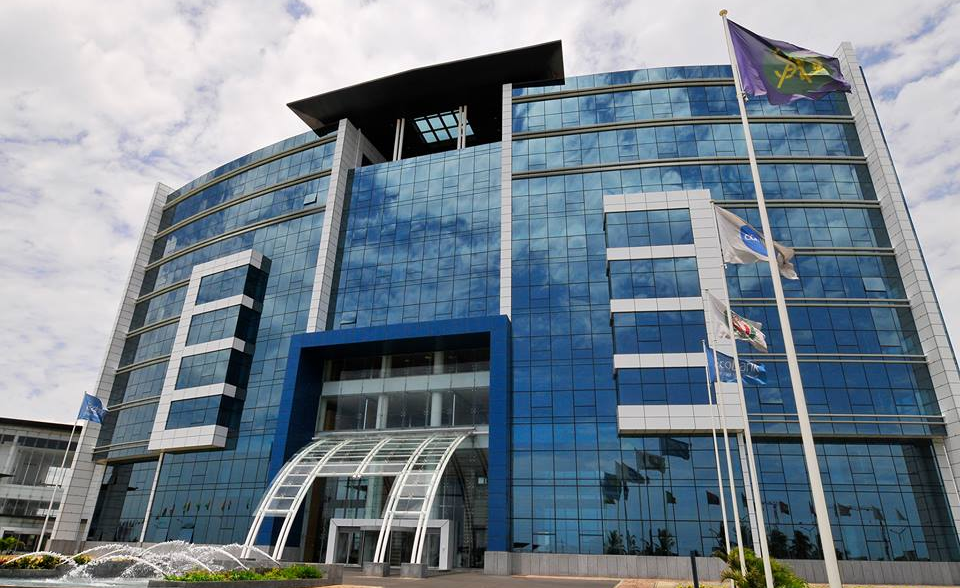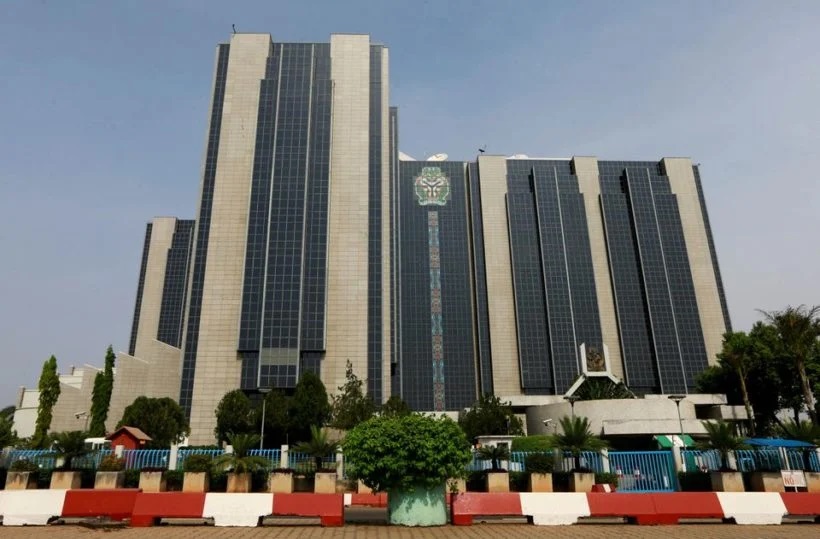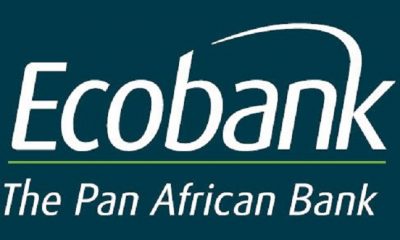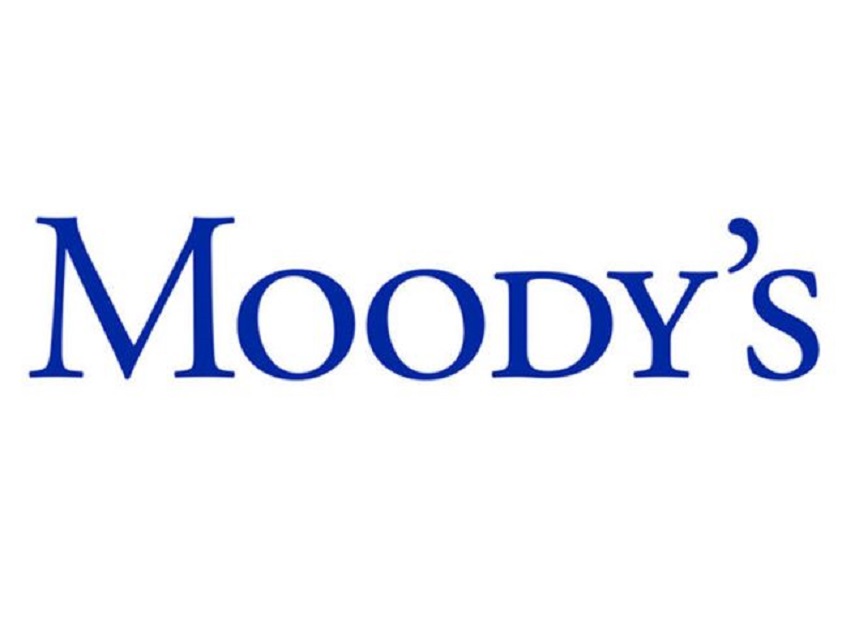Banking
Moody’s Assigns first-time B2 Issuer Rating to Ecobank

By Dipo Olowookere
Leading global rating company, Moody’s Investors Service (Moody’s) last week announced assigning first-time B2/Not Prime global local- and foreign-currency issuer ratings to Ecobank Transnational Incorporated (ETI), a Pan-African bank holding company incorporated in Togo.
According to Moody’s, the long-term ratings carry a stable outlook and as part of its analysis, the rating agency also assigned a notional baseline credit assessment (BCA) and adjusted BCA of b2 and b1, respectively, based on ETI’s consolidated financial statements.
Moody’s explained that ETI’s ratings reflect the group’s stable funding and liquidity profile, expansive geographic and business diversification, recovering profitability and Moody’s assessment of a moderate probability of affiliate support in case of need.
It noted that these strengths are balanced against the group’s high, but potentially moderating, asset risks and modest capital buffers, which are largely legacy issues that the bank’s new management is pro-actively addressing as part of a broader strategic plan. The new strategy also introduces digitalization and cost-cutting initiatives.
The rating agency disclosed that the stable outlook balances ETI’s stable funding profile, recovering profitability and business diversification against the group’s elevated, but potentially moderating, asset risks and modest capital buffers, which the rating agency expects will only slowly improve over the next 12-18 months in the context of continued challenges in the external environment of emerging markets.
ETI is a pan-African banking group, with banking subsidiaries in 33 African countries and total assets of $21.6 billion as of June 2018. As a bank holding company incorporated in Togo, which is part of the West African Economic and Monetary Union (WAEMU), it is regulated by the Central Bank of the West African States (BCEAO), the regional central bank.
According to Moody’s, ETI’s BCA of b2 reflects the group’s stable funding and liquidity profile, recovering profitability, diversification benefits and improving, but still challenging, macro-economic conditions in the African continent, balanced against the group’s elevated asset risks and modest capital buffers.
More specifically, it said the ratings reflect ETI’s deposit-based funding structure, with customer deposits accounting for 71 percent of total assets as of June 2018, and with limited reliance on riskier short-term market funding.
ETI’s deposits are granular and have historically proved stable, while the bank also has access to longer-duration market funding, which helps support its liquidity management and better match the duration of its assets and liabilities.
The group also maintains strong liquidity buffers, with cash and interbank balances representing 19 percent of total assets, while it can also count on an additional 28 percent of investment securities and government bonds, most of which can be repurchased through its subsidiaries’ respective central banks to source additional liquidity in case of need.
Moody’s also noted that as a Pan-African bank with banking subsidiaries in 33 African countries, ETI can substantially benefit from geographic and business diversification. The granular nature of ETI’s operations, combined with its entrenched African franchise helps diversify credit, operational and business risks.
In addition, the group’s broad diversification might act as a counterweight in times of stress by giving ETI a range of alternative sources of income and resources when other parts of the group may face challenges. Moody’s incorporates such benefits in the standalone BCA of the group.
Moody’s also noted that the group’s revised strategy makes it clear that management is committed to ensuring that all banking subsidiaries follow strict loan underwriting and risk management standards while reporting an adequate return on equity, with a clear understanding that a rationalisation of the group’s footprint may be needed where these goals cannot be achieved in a timely manner.
During 2017 and H1 2018, the group has already recorded a significant improvement in its earnings generating capacity, supported by the new management team’s focussed strategy and reorganisation initiatives that have led to cost cutting and lower provisioning requirements (2.6 percent of gross loans for H1 2018 compared to 7.8 percent in 2016). For H1 2018, the group reported bottom-line profits to ordinary shareholders of $135 million, up 28 percent year-on-year.
According to Moody’s, another credit factor behind the ratings assigned today is Africa’s economy and operating environment. Moody’s recognises that economic growth in Sub-Saharan Africa is accelerating, which will provide significant business opportunities for ETI, but also notes that the operating environment remains challenging. The rating agency uses a “Very Weak+” Macro Profile assessment for ETI, which is the weighted average of the Macro Profiles of the principal countries and regions in which the bank operates; more specifically: Cote d’Ivoire’s newly assigned “Weak-“; Nigeria’s “Very Weak+”; Ghana’s “Very Weak”; and Tanzania’s “Very Weak+”.
ETI’s ratings also reflect the group’s high asset risks, with the non-performing loans (NPLs)-to-gross loans ratio at 9.6 percent as of June 2018 and still high provisioning requirements (2.6 percent of gross loans for H1 2018).
Going forward, Moody’s said it does, however, expect a gradual reduction in NPL levels as economic growth accelerates and ETI strengthens its risk management capabilities and the new management’s on-going emphasis on improving its risk culture.
Similarly, Moody’s says considers the group’s capital buffers as modest, with the Moody’s-adjusted Basel II/III tangible common equity-to-risk-weighted assets ratio estimated at 5.6 percent as of December 2017, below the level reported by similarly-rated banks (of around 13 percent).
According to Moody’s, ETI’s major shareholders remain committed long-term investors, and Moody’s assesses that there is a moderate probability that they will support the institution with additional capital in case of stress. Moody’s therefore incorporates a one notch rating uplift due to affiliate support, placing ETI’s notional adjusted BCA at b1.
As a pan-African group with banking subsidiaries in 33 African countries, ETI remains an important institution for the African continent, and even more so for the WAEMU region, where it is incorporated and regulated by BCEAO, and where 40 percent of the group’s operations are situated. Although Moody’s does not impute any government support uplift, the rating agency assesses that in case of need the regulatory authorities will show flexibility and certain degree of forbearance that will allow enough time for management and shareholders to recapitalize the group.
ETI is a non-operational financial holding entity and its issuer rating is positioned one notch below its notional adjusted BCA of b1. This is because holding-company creditors are subordinated to creditors at banking subsidiaries in a bankruptcy or resolution context, and are thus likely to experience higher losses. This is also the case for ETI, which relies on the up-streaming of dividends from its investments to repay its own liabilities.
Moody’s said the stable outlook balances ETI’s relative strong funding and liquidity position, recovering profitability and business diversification benefits, against the group’s modest capital buffers and elevated — but potentially moderating — asset risks. Over the next 12 months, the rating agency expects that ETI’s NPL ratio will remain high despite a gradual reduction and lower NPL formation.
The rating agency said a rigorous implementation of management’s initiatives to strengthen the fundamental operations of the group and realise its full diversification potential, especially as measured by ETI’s non-performing loans and capital metrics, would lead to upward rating pressure.
Banking
We Now Pay Depositors of Failed Bank Within Days—NDIC

By Adedapo Adesanya
The Nigeria Deposit Insurance Corporation (NDIC) says depositors of failed banks in Nigeria can now access their insured funds within days.
The corporation said the development is a part of ongoing reforms aimed at strengthening confidence in the country’s financial system.
The chief executive of NDIC, Mr Thompson Sunday, disclosed this on Thursday at the NDIC Special Day of the 47th Kaduna International Trade Fair, noting that recent interventions had significantly improved the speed and efficiency of depositor compensation.
Represented by Mrs Regina Dimlong, the Assistant Director of Communications and Public Affairs, Mr Sunday said the corporation had successfully deployed the Bank Verification Number (BVN) system to facilitate prompt payments to customers of recently failed banks, including Heritage Bank Limited, Union Homes Plc and Aso Savings and Loans Plc.
“Depositors were paid within days of closure without the need to fill physical forms or visit NDIC offices.
“This is a part of our reform efforts to make depositor protection faster, simpler and more transparent,” he said.
According to him, the reforms were designed to restore public confidence in the banking system and prevent panic withdrawals, especially during periods of financial stress.
Mr Sunday explained that NDIC’s mandate spans deposit insurance, bank supervision, distress resolution and liquidation of failed banks, adding that the Corporation works closely with the Central Bank of Nigeria (CBN) to ensure early detection of risks in insured institutions.
He disclosed that in 2024, NDIC reviewed its deposit insurance framework, increasing coverage for depositors of Deposit Money Banks, Mobile Money Operators and Non-Interest Banks to N5 million, while customers of Microfinance Banks, Primary Mortgage Banks and Payment Service Banks are now covered up to N2 million.
He noted that the revised thresholds now guarantee full protection for about 99 per cent of depositors nationwide, particularly small savers and low-income earners.
The NDIC boss urged Nigerians to ensure their BVNs are properly linked to their bank accounts, stressing that this had become the primary channel for accessing insured deposits in the event of bank failure.
Banking
Nigeria Gets Permanent Seat on African Central Bank Board

By Adedapo Adesanya
Nigeria has secured a major strategic gain at the ongoing 39th African Union Summit, after securing a permanent seat on the board of the African Central Bank.
The Minister of Foreign Affairs, Mr Yusuf Tuggar, confirmed this at the summit on Friday, highlighting it as a significant milestone for both Nigeria and the West African region.
The African Central Bank (ACB) is one of the original five financial institutions and specialised agencies of the African Union (AU).
“Importantly, Nigeria has been given the hosting of the African Monetary Institute and the African Central Bank. Not only that, in today’s plenary, Nigeria was confirmed a seat on the board of the African Central Bank. This is huge,” he said.
He stated that the development represents a diplomatic breakthrough, mentioning that the move faced initial opposition from some member states.
“It is something that was initially resisted by some countries, so now we have a permanent seat on the African Central Bank board. It’s a major success,” he added.
This year’s summit carries the theme Assuring Sustainable Water Availability and Safe Sanitation Systems to Achieve the Goals of Agenda 2063, the sessions will focus on advancing continental commitments to sustainable water management and improved sanitation, critical pillars for health, agricultural productivity, and the broader development aspirations of the AU’s Agenda 2063 framework.
Beyond financial governance, Nigeria and the West African bloc also recorded progress in elections to the Peace and Security Council, the African Union’s highest decision-making body on conflict and security matters.
The delegation announced that “Côte d’Ivoire, Sierra Leone, and the Republic of Benin have been elected,” with Benin securing a fresh term while the other two countries were re-elected.
The Peace and Security Council also convened to deliberate on the situations in Sudan and Somalia. Nigeria voiced strong reservations over Sudan’s potential readmission into the continental body.
“Nigeria voiced its reservations about Sudan being readmitted because, as you know, there are two warring factions in Sudan,” Tuggar stated.
“We reminded the Peace and Security Council that we have to abide by the rules and regulations of the African Union. If there has been an unconstitutional change of government, then the country should not be allowed to participate, and that was carried.”
The summit also outlined its 2026 theme: water sustainability. The Nigerian representative underscored the country’s strategic and demographic significance in advancing that agenda.
“Nigeria was created out of the confluence of the River Niger and the River Benue. So water is very important,” he said.
“We are the largest country in Africa, with a population of 230 million people. We’re going to be 400 million in the next 24 years. So water is a source of life. It’s very important, and we’re playing a very pivotal role in implementing the programs that are being set for the theme of the year.”
Banking
Standard Bank Hosts 2nd African Markets Conference

By Modupe Gbadeyanka
The second African Markets Conference (AMC) will take place in Cape Town, South Africa, from Sunday, February to Tuesday, February 24, 2026.
The event, hosted by Standard Bank, will bring together global institutional investors, sovereign wealth funds, and African policymakers to catalyse the flow of capital into the continent’s most critical sectors.
The theme for this year’s edition is Mobilising Global Capital at Scale for Africa’s Growth and Development.
AMC 2026 will host a high-level delegation of decision-makers, ensuring that the dialogue leads to tangible commitments.
The conference will be structured around five high-impact pillars designed to move the needle on investment, including prioritising infrastructure as an asset class, accelerating the energy transition, deepening African capital markets and mobilising private capital, enabling intra-African trade and flows of capital, and addressing Africa’s sovereign debt and cost sustainability.
It is estimated that by 2050, Africa will add one billion people, more than half in cities, yet it invests only $75 billion of the $150 billion it needs annually for infrastructure. Standard Bank aims to use AMC 2026 to ensure that African priorities remain at the centre of the global financial discourse.
“This year’s engagement bridges the gap between policy ambitions and market realities. Africa urgently needs practical measures to deepen capital pools, improve market liquidity, and strengthen regulatory frameworks that give investors the confidence to deploy capital at scale.
“Mobilising capital is not just about funding projects; it is about building the foundation of a more balanced and inclusive global economy,” the chief executive of Corporate and Investment Banking at Standard Bank Group, Luvuyo Masinda, stated.
-

 Feature/OPED6 years ago
Feature/OPED6 years agoDavos was Different this year
-
Travel/Tourism10 years ago
Lagos Seals Western Lodge Hotel In Ikorodu
-

 Showbiz3 years ago
Showbiz3 years agoEstranged Lover Releases Videos of Empress Njamah Bathing
-

 Banking8 years ago
Banking8 years agoSort Codes of GTBank Branches in Nigeria
-

 Economy3 years ago
Economy3 years agoSubsidy Removal: CNG at N130 Per Litre Cheaper Than Petrol—IPMAN
-

 Banking3 years ago
Banking3 years agoSort Codes of UBA Branches in Nigeria
-

 Banking3 years ago
Banking3 years agoFirst Bank Announces Planned Downtime
-

 Sports3 years ago
Sports3 years agoHighest Paid Nigerian Footballer – How Much Do Nigerian Footballers Earn

















